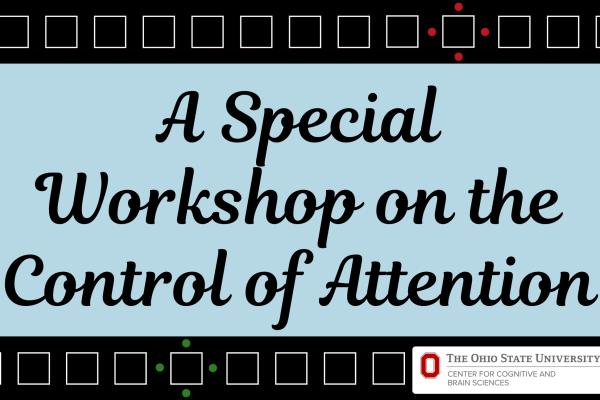
A Special Workshop on the Control of Attention
Honoring the Career Contributions of Charles Folk (Villanova U) & Roger Remington (U of Minnesota)
Ohio Union, Great Hall Meeting Room
Over the past several decades, Chip Folk and Roger Remington have pioneered major advances in understanding how humans control attention. Their 1992 Contingent Involuntary Orienting Hypothesis and subsequent joint works have impacted thousands of research studies and inform most theories of attention today. Both Chip and Roger have contributed consequential independent work beyond their collaboration as well. Join us for special colloquia from the honored guests and a series of research talks from invited speakers from across North America and beyond. The conference will discuss the latest work in the field, and reflect on the scientific impact of Chip and Roger, and it will take some time to share personal stories from friends and colleagues as well.
This event features an opening talk from Chip Folk and Roger Remington on Friday, Oct 18 and the main colloquia on Oct 19. If you're interested in attending the talk on Friday evening (7 pm), please indicate so at registration. Space is limited for the Oct 18 talk so CCBS will confirm your attendance. Registration is uncapped for the main event on Oct 19.


Saturday Speakers:
Brad Gibson, University of Notre Dame - How to Elicit and Detect Voluntary Attention Control in the Lab
Geoff Woodman, Vanderbilt University - After an item captures attention, can we watch the brain as it compares the attended time to the target memory?
Steve Mitroff, George Washington University - Task relevance can be a slippery concept
Nancy Carlisle, Lehigh University - How Relevance Interacts with Salience to Drive Attention
Joy Geng, University of California, Davis - Beyond the target: dynamic attentional control settings improve visual search efficiency
Brad Wyble, Pennsylvania State University - Learning the True Meaning of Capture
Sarah Shomstein, George Washington University - The Relevance of Task-Irrelevance
Andy Leber, The Ohio State University - When and why we control attention: roles of past experience and effort
Katherine Moore, Arcadia University - Capturing attention again and again
Brad Stilwell, Texas A&M University - How do we learn to suppress distractors: first-order, second-order, or both?
Julie Golomb, The Ohio State University - The consequences of attentional capture for perception and memory
Nick Gaspelin, University of Missouri - Salience Effects on Attentional Selection are Enabled by Task Relevance
Jan Theeuwes, Vrije Universiteit - Attention capture: contingent or stimulus-driven? a brief history and (remaining) controversies
Anthony Harris, University of Queensland - On the primacy of attentional guidance by relative feature relationships
Brian Anderson, Texas A&M University - Attentional Control Settings Revisited
Brief Remarks from Ed Awh (U of Chicago), Deborah Boehm-Davis (GeorgeMason Univ), Shu-Chieh Wu (NASA Ames & San Jose State Univ), and Toby Mordkoff (Univ of Iowa)
